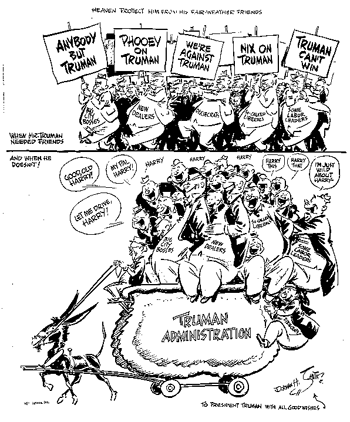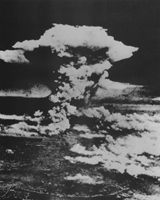
|
"Heaven Protect
Him From His Fairweather Friends"
Truman Library |
 We
left off last hour, April 12, 1945, the death of Franklin Delano Roosevelt.
Harry Truman, the newly elected Vice-President, tried to fill the oversized
shoes of a man whom for most Americans was the only president they had
ever known. Harry Truman, a middle-sized man from Missouri, was described
then and has been described since as "the common man's common man."
Certainly he was one of the most controversial and colorful figures
ever to occupy the Oval Office of the White House. Many loved him, many
hated him. No one can deny that he was a colorful character. Historians
recently have reassessed the Truman administration, and many have placed
Harry Truman in the upper echelons of the great presidents who've served
in American history. We
left off last hour, April 12, 1945, the death of Franklin Delano Roosevelt.
Harry Truman, the newly elected Vice-President, tried to fill the oversized
shoes of a man whom for most Americans was the only president they had
ever known. Harry Truman, a middle-sized man from Missouri, was described
then and has been described since as "the common man's common man."
Certainly he was one of the most controversial and colorful figures
ever to occupy the Oval Office of the White House. Many loved him, many
hated him. No one can deny that he was a colorful character. Historians
recently have reassessed the Truman administration, and many have placed
Harry Truman in the upper echelons of the great presidents who've served
in American history.
The Character of Harry
Truman
Truman was a loyal, but honest party man, a joiner without peer,
as many said of him. He belonged to over 218 organizations. He was the
sort of politician that went around kissing babies, shaking hands, smiling
when he had to, and "sticking a knife in the back" if he had
to as well. Truman had gotten the vice-presidential nomination in 1944
because many Democrats were unhappy about the then vice-president, Henry
Wallace, who was to the far left of the political spectrum. Knowing
that he faced a difficult reelection in the midst of the war, FDR wanted
Wallace off the ticket. Roosevelt took a survey of the various factions
of the Democratic Party and, lo and behold, Harry Truman ended up number
two on everybody's list. And so this ultimate joiner, this man who had
had a largely undistinguished career in the United States Senate since
his election in 1934, became the new Vice-President of the United States.
|
Harry
S Truman, Official Portrait
National Archives |
As Vice-President, Truman
was a self-described "political eunuch." FDR's New Deal intimates
disdained Truman; one described him as "a small-bore politician
of country courthouse caliber only." Taking office shortly before
FDR's death, Truman was denied knowledge of what was really going on.
He had no knowledge of the secret deals that Franklin Roosevelt had
cut with Winston Churchill and Josef Stalin, he had no knowledge of
the Manhattan Project and the new terrifying weapon the atomic bomb,
that he, as President, would have to make a decision whether or not
to use. The public nonetheless quickly came to know Harry Truman as
a direct man, an uncomplicated man, a man who spoke forthrightly, honestly,
directly to the American people—a cocky, arrogant man, and yet
filled with homespun honesty. His humility could be enduring. On learning
of Roosevelt's death, Truman had this to say to a group of reporters:
"Boys, if you ever pray, pray for me now. I don't kno w if you fellas
ever had a load of hay fall on you, but when they told me what happened
yesterday, I felt like the moon, the stars, and all the planets had
fallen on me."
 On this man fell the responsibility
for defeating the Germans in the final weeks and months of the European
war, on this man fe ll the responsibility finally for making the decision
to drop the atomic bomb on Hiroshima and Nagasaki. Truman let it be
known right after he entered the Oval Office what the position of the
United States would be in regards to the European war, and in regards
to the Japanese war. Listen to what he said [voice
of Truman]. "Our concern with Harry Truman is not
so much with his immediate attempts in foreign policy, his immediate
attempts to end the European war, and to end the Pacific war.That
decision to drop the atomic bomb in August on Hiroshima did bring the
Japanese quickly to surrender. Truman was able to announce that surrender
even before it became formal to the American public, and announced,
as he does here, the end to World War II." On this man fell the responsibility
for defeating the Germans in the final weeks and months of the European
war, on this man fe ll the responsibility finally for making the decision
to drop the atomic bomb on Hiroshima and Nagasaki. Truman let it be
known right after he entered the Oval Office what the position of the
United States would be in regards to the European war, and in regards
to the Japanese war. Listen to what he said [voice
of Truman]. "Our concern with Harry Truman is not
so much with his immediate attempts in foreign policy, his immediate
attempts to end the European war, and to end the Pacific war.That
decision to drop the atomic bomb in August on Hiroshima did bring the
Japanese quickly to surrender. Truman was able to announce that surrender
even before it became formal to the American public, and announced,
as he does here, the end to World War II."
The public quickly learned that this was a different kind of man who would run a different kind of presidency than had Franklin Delano Roosevelt. One of America's first introductions to this new president, and to the Truman spunk and cockiness, came very early in the administration. Harry Truman had a daughter, Margaret Truman. Some of you may know her now as the writer at not terribly successful mystery stories. But when Truman first came into the Oval Office in Washington D.C., young Margaret fancied a career as an opera singer. Harry loved to play the piano, he was a decent tinkler of the ivories—they used to sit at home in the house in Independence, Missouri, and Harry would tinkle on the keys and Margaret would sing one of her operatic arias. She'd taken a number of voice lessons and she believed she had a great future as a star on the opera stage. Shortly after her father became president, Margaret had an opportunity to make her concert debut in one of the major halls in Washington D.C. She did. The Washington Post sent their nationally known movie critic, Paul Hume, or music critic, Paul Hume, to review Margaret's performance. In the next day’s newspapers, in the Washington Post, Paul Hume had this to say: "Margaret cannot sing very well. She was flat most of the time." And he went on to write a generally unflattering review. The president was incensed at this criticism of his daughter, and taking out a piece of White House stationary, he dashed off the following note to Paul Hume, a note, which, of course, the Washington Post immediately published: "I have just seen your lousy review of Margaret's concert. It seems to me you’re a frustrated old man. Some day I hope to meet you. When that happens you'll need a new nose, a lot of beefsteak for black eyes, and perhaps a jock supporter below. Signed, HST, president." Well, the American public was not accustomed to the president of the United States behaving in such a fashion.
Upon this man fell the responsibility for defeating the Germans in the final weeks and months of the European war, upon this man fell the responsibility finally for making the decision to drop the atomic bomb on Hiroshima and Nagasaki. Truman let it be known right after he entered the Oval Office what the position of the United States would be in regards to the European war, and in regards to the Japanese war. Listen to what he said:
"Our demand has been and it remains unconditional surrender."
Our concern with Harry Truman is not so much with his immediate attempts in foreign policy, his immediate attempts to end the European war, and to end the Pacific war. That decision to drop the atomic bomb in August on Hiroshima did bring the Japanese quickly to surrender. Truman was able to announce that surrender even before it became formal to the American public, and announced, as he does here, the end to World War II.
"…full acceptance of the Potsdam Declaration, which specifies the unconditional surrender of Japan. In their reply there is no qualification. Arrangements are now being made for the formal signing of the surrender terms at the earliest possible moment. General Douglas MacArthur has been appointed the Supreme Allied Commander to receive the Japanese surrender. The proclamation of V-J Day must wait until the formal signing of the surrender terms by Japan. "
What we're really concerned
about for the rest of our time together today is the impact Harry Truman
had on domestic policy, on changing domestic policies in the late 1940s,
and into the early 1950s. Recall that I said last hour, the period of
the Truman administrations and into the early 1950s, is a period in
which we can see a definite shift to the political, the economic, the
social, the psychological right in American society. It is an era of
a new conservatism that laid the groundwork for the Eisenhower years
of the 1950s; a conservatism only briefly under attack and on the run
during the administrations of John F. Kennedy and Lyndon Johnson in
the 1960s; a conservatism that reemerges and returns to the White House
in full stride with Richard Milhous Nixon in the late 1960s and the
1970s; a conservatism that came to fruition during the years of Ronald
Reagan in the 1980s; a conservatism under which we still live and or
labor, depending on your viewpoint, under the current incumbent of the
Oval Office. |